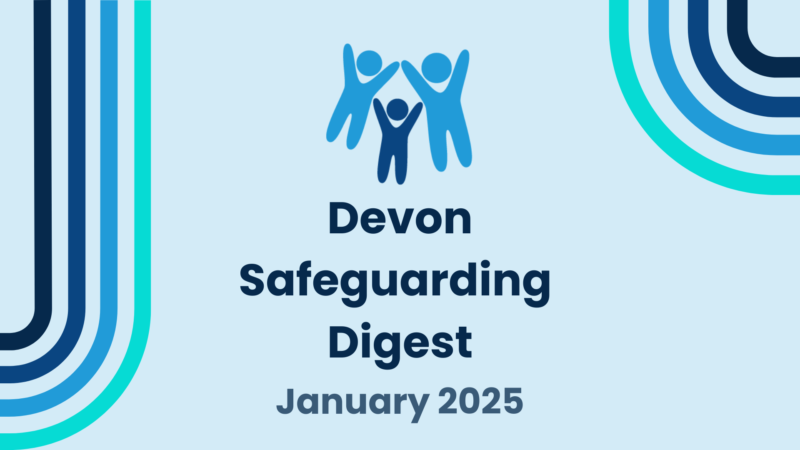Devon Safeguarding Digest – January 2025

Welcome to the January Devon Safeguarding Digest! This regular update will help you stay up to speed with safeguarding news and local policy changes.
Children’s Wellbeing and Schools Bill introduced to Parliament
The Bill, which was introduced on 17 December 2024, contains seven main elements:
- Making a child-centred government: Place children with complex needs in community provision, strengthen Ofsted’s powers, limit agency workers in social care, and protect 16-17 year olds from ill-treatment.
- Keeping families together and children safe: Mandate family group decision making, improve information sharing, strengthen education’s role in safeguarding, and implement multi-agency child protection teams.
- Supporting children in the care system to thrive: Publish local offers for kinship care, extend virtual school head role, & ‘Staying Close’ support for care leavers.
- Cracking down on excessive profit making: Cap profits for care providers if necessary, support regional care co-operatives, and establish financial oversight for care providers.
- Driving high and rising standards for every child: Establish core national standards, deliver on school admissions and curriculum commitments, and end academies prioritisation.
- Removing barriers to opportunity in schools: Provide free breakfast clubs for primary school children and limit branded uniform items.
- Creating a safer and higher quality education system for every child: Introduce Children Not In School registers, require local authority consent for home education of children subject to s.47 inquiries or under child protection plans, and improve regulation of independent schools and teacher misconduct cases.
Read more about the bill and what people have to say, or you can see the full bill online here.
Inquiry to look at ‘huge task’ of special educational needs reform in England
News of a new inquiry indicates immediate Send reform is unlikely. The previous inquiry lasted 18 months and published its findings in 2019.
As part of this inquiry, the MPs of the cross-party education committee plan to investigate areas such as: the support systems for Send in countries with higher levels of satisfaction, helping schools be more inclusive towards Send, increasing capacity and reforming funding for Send, and potentially looking at alternatives to the Education, Health, and Care Plans (EHCPs) without removing any needed support.
Coram research finds local authorities routinely failing in duties to homeless children
The law is that homeless 16-17-year-olds should receive a child in need assessment under s.17 of the Children Act 1989 and – if found in need – are owed a duty to be care housed under s.20 of the same Act. This entitles them to the care and protection afforded to children in care until 18 and then to support as a care leaver until 25.
The study found seven key barriers to young people receiving this:
- Many 16-17-year-olds who become homeless are not assessed or are housed under the wrong legislation (the Housing Act 1996) with no support from children’s social care until the age of 25.
- Local authorities gatekeep and ‘wait out the clock’ until children turn 18.
- Vulnerable 16-17-year-olds are housed in unsuitable/unsafe accommodation including adult hostels, unregulated or under-supervised provision.
- Many homeless 16-17-year-olds are given inaccurate information and make uninformed decisions.
- Children navigate the complexities of the different support options without consistent advice and advocacy.
- National data on homeless 16-17-year-olds is incomplete.
- Vital early help & support to families that could prevent homelessness is missing.
Read more about what Coram recommends and what people have to say on their website. Alternatively, you can download and view the full report as a PDF here.
Former Ofsted head says child safety must come before adult sensitivity
Amanda Spielman argued in a column for The Times that:
- Children’s Social Care should accept that some children simply cannot be safely raised by their birth families.
- The equalities framework should be reviewed so that social workers do not need to be as concerned with cultural sensitivities in families if a child is at risk.
- Inspection findings on safeguarding failures need to be responded to and not dismissed.
Read the full article online here.
Independent safeguarding audit of Exeter Diocese and Cathedral published
The report of an independent safeguarding audit of Exeter Diocese (covering Devon, Torbay, Plymouth) & Exeter Cathedral was published in December.
The findings were broadly positive, identifying a number of recommendations, some of which are:
- creating more opportunities for feedback on the culture;
- developing guidance/resources to help staff/volunteers differentiate between safeguarding and conduct concerns;
- designing and delivering joint face-to-face safeguarding training for Parish Safeguarding Representatives s and their Parochial Church Councils.
- implement a thematic approach to safeguarding oversight, e.g. focusing on a different element of Church of England National Safeguarding Standards at each meeting.
- scope the opportunity to consolidate a single Safeguarding Directorate for the Diocese, with the creation of a Director of Safeguarding role to provide strategic oversight, advice, and safeguarding support across the DBF, parishes, and the Cathedral.
- a review of the Cathedral’s complaints process and procedures.
There is a specific recommendation that:
“To improve communication and collaboration with statutory safeguarding partners, the Diocesan Safeguarding Advisory Panel (DSAP) Chair (or a designated representative) should hold brief, focused one-to-one meetings with key statutory leads two or three times per year. This will allow for valuable information exchange on safeguarding trends, legislation, and best practices, which can then be shared with the full DSAP to enhance their understanding and effectiveness.”